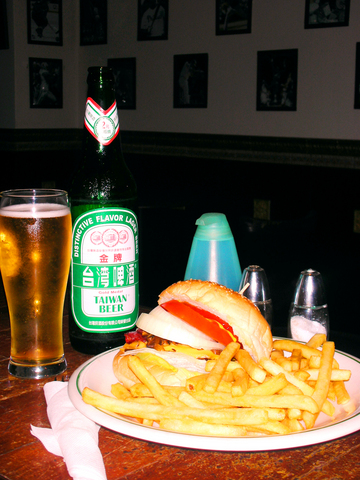Since FuBar opened last year it has become a hit with expats and locals in Taichung wanting to kick back and relax while watching their favorite game and sucking back some suds. The satellite dish and sling box gives sports fans top-notch coverage of sports including MLB and Taiwanese baseball, NBA and SBL basketball, NHL hockey, rugby and NCAAs, as well as F1 and NASCAR racing. Indeed, sports fans wanting a fix of their favorite sport could hardly find a place that provides a more eclectic mix of coverage than FuBar.
Hailing from Ontario, Canada, owner Dwayne Worden says he wanted to fill a gap in Taichung's sports bar scene by adding the screens and sports coverage.
Located in the pedestrian-only "Soho Street," the simply decorated watering hole offers punters a no-frills place to chow down on reasonably priced food, enjoy a pint of beer, hang out on the front patio or gape at one of two large-screen televisions in the air-conditioned interior. Like the pub itself, the menu is simple, offering patrons a small variety of high cholesterol chow that will please any barstool sports fan.

PHOTO: COURTESY OF FUBAR
The menu, though limited, means that great care is put into all the grease-laden creations. The FuBurger (NT$220) rates high on the expat scale of delicious burgers. The bun is the right size to house the juicy patty, bacon and cheese. The fries are crispy, loaded with fat and, well, yummy. The chicken burger (NT$180) is also grilled to perfection and comes served with fries.
No pub operated by a Canadian expat would be complete without poutine (NT$180) that Canuck favorite which comes with a whopping amount of fries topped with cheese and smothered with gravy. Those wanting something a little zingier can opt for the chili cheese fries for the same price. The menu rounds out with a plump hot dog (NT$150) and BLT sandwich (NT$170), both of which are served with all the fixings and a mountain of fries.
For a while, the pub was known about Soho for its zesty Caesar (NT$200), but this was taken off the menu because Clamato juice is currently difficult to find. Expect it to reappear when Worden finds a source. In the meantime, shots (NT$100), beers (NT$100 to NT$180) and an assortment of mixed drinks (NT$150) will have to quench the thirst of sports fans.

On April 26, The Lancet published a letter from two doctors at Taichung-based China Medical University Hospital (CMUH) warning that “Taiwan’s Health Care System is on the Brink of Collapse.” The authors said that “Years of policy inaction and mismanagement of resources have led to the National Health Insurance system operating under unsustainable conditions.” The pushback was immediate. Errors in the paper were quickly identified and publicized, to discredit the authors (the hospital apologized). CNA reported that CMUH said the letter described Taiwan in 2021 as having 62 nurses per 10,000 people, when the correct number was 78 nurses per 10,000

May 5 to May 11 What started out as friction between Taiwanese students at Taichung First High School and a Japanese head cook escalated dramatically over the first two weeks of May 1927. It began on April 30 when the cook’s wife knew that lotus starch used in that night’s dinner had rat feces in it, but failed to inform staff until the meal was already prepared. The students believed that her silence was intentional, and filed a complaint. The school’s Japanese administrators sided with the cook’s family, dismissing the students as troublemakers and clamping down on their freedoms — with

As Donald Trump’s executive order in March led to the shuttering of Voice of America (VOA) — the global broadcaster whose roots date back to the fight against Nazi propaganda — he quickly attracted support from figures not used to aligning themselves with any US administration. Trump had ordered the US Agency for Global Media, the federal agency that funds VOA and other groups promoting independent journalism overseas, to be “eliminated to the maximum extent consistent with applicable law.” The decision suddenly halted programming in 49 languages to more than 425 million people. In Moscow, Margarita Simonyan, the hardline editor-in-chief of the

Six weeks before I embarked on a research mission in Kyoto, I was sitting alone at a bar counter in Melbourne. Next to me, a woman was bragging loudly to a friend: She, too, was heading to Kyoto, I quickly discerned. Except her trip was in four months. And she’d just pulled an all-nighter booking restaurant reservations. As I snooped on the conversation, I broke out in a sweat, panicking because I’d yet to secure a single table. Then I remembered: Eating well in Japan is absolutely not something to lose sleep over. It’s true that the best-known institutions book up faster